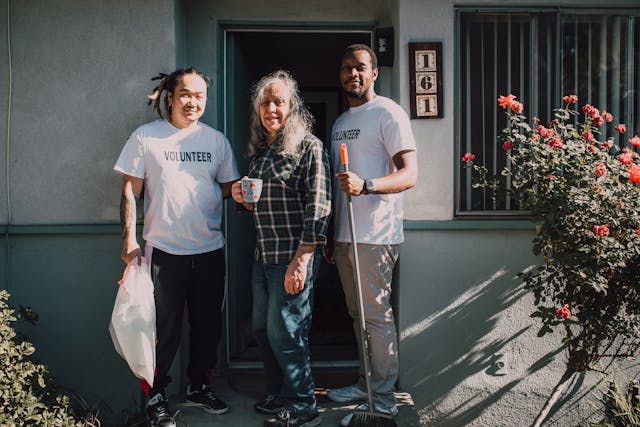Introduction
Psychosocial Support in Humanitarian Crises is a vital component of emergency response that addresses the mental, emotional, and social well-being of individuals affected by disasters, conflict, or displacement. During humanitarian crises, people experience significant stress and trauma, which can severely impact their mental health and hinder their ability to recover. Providing psychosocial support (PSS) is essential for helping individuals cope with these challenges, promoting healing, and supporting their recovery.
This course is designed for humanitarian workers, social workers, mental health professionals, and program managers who are involved in providing psychosocial care and support in crisis settings. Participants will gain a comprehensive understanding of the psychological needs of affected populations and learn effective strategies to provide support, build resilience, and integrate mental health services into humanitarian response efforts.

What Is Psychosocial Support in Humanitarian Crises?
Psychosocial support in humanitarian crises refers to a range of activities, interventions, and services that aim to restore emotional well-being, build resilience, and promote mental health in individuals and communities affected by crises. PSS activities are designed to address both the immediate emotional distress caused by the crisis and the long-term psychological impact that may persist after the crisis.
Key aspects of PSS include:
- Psychological first aid to address immediate mental health needs
- Supportive counseling and therapy to help individuals process trauma
- Community-based support programs that strengthen social networks
- Awareness campaigns and mental health education to reduce stigma and promote coping strategies
PSS is an integral part of a holistic response to humanitarian crises, alongside the provision of food, shelter, health care, and protection services.
Course Objectives
By the end of this course, participants will:
- Understand the principles of psychosocial support in humanitarian settings.
- Learn how to assess the psychosocial needs of individuals and communities affected by crises.
- Develop skills to provide psychological first aid and basic counseling to those in distress.
- Gain knowledge of community-based psychosocial support programs and how to implement them effectively.
- Learn to integrate mental health into broader humanitarian programming (health, protection, education, etc.).
- Understand the ethical considerations and cultural sensitivity required when providing psychosocial support.
- Build resilience and coping mechanisms in individuals and communities affected by trauma.
Why Psychosocial Support Matters in Humanitarian Crises
The Psychological Impact of Crises
Humanitarian crises, such as armed conflict, natural disasters, and forced displacement, often result in widespread psychological distress. Survivors may experience trauma, grief, anxiety, depression, and post-traumatic stress disorder (PTSD). These mental health challenges can impair recovery, hinder economic stability, and prevent individuals from fully participating in rebuilding their communities.
- Improve overall well-being, leading to more resilient and healthier communities.
- Restore mental health and emotional well-being.
Enhancing Recovery and Resilience
Psychosocial support enables individuals to recover from trauma and build resilience, equipping them with coping strategies to deal with ongoing challenges. It empowers individuals and communities to rebuild their lives, find hope, and regain control over their futures. Psychosocial interventions also prevent the intergenerational transmission of trauma, ensuring that the next generation is not burdened by the same psychological burdens.
Supporting Protection and Human Rights
Psychosocial support is inherently linked to protection and human rights. Survivors of violence, abuse, and exploitation need mental health care to heal and regain their sense of safety and security. By providing adequate psychosocial care, humanitarian organizations ensure that vulnerable populations receive dignified and holistic care.
Core Components of Psychosocial Support
1. Psychological First Aid (PFA)
Psychological First Aid (PFA) is an immediate, short-term support intervention for individuals who have experienced trauma. The goal of PFA is to reduce stress, provide emotional comfort, and promote safety. Participants will learn:
- Basic listening skills to provide immediate emotional support.
- Assessing distress and identifying when professional mental health care is needed.
- The importance of creating a safe environment and offering practical support (food, water, shelter).
- Stabilizing emotional responses and helping individuals manage initial feelings of shock and anxiety.
2. Counseling and Therapy
For individuals with acute or ongoing mental health needs, providing access to counseling or psychotherapy can be crucial for long-term recovery. This module will cover:
- Basic counseling techniques: listening, empathetic response, and building trust.
- Trauma-informed care: understanding how trauma affects mental health and how to respond appropriately.
- Approaches such as cognitive behavioral therapy (CBT), narrative therapy, and group therapy for survivors of trauma.
- Recognizing warning signs of mental illness and ensuring proper referral to mental health professionals.
3. Community-Based Psychosocial Support
Communities affected by crises often experience collective trauma. Providing community-based psychosocial support helps strengthen social networks, foster mutual support, and rebuild community cohesion. Key topics include:
- Community mobilization and the role of community-based organizations in PSS.
- Building safe spaces for group healing and support (e.g., community centers, peer-led groups).
- Culturally appropriate interventions: tailoring programs to meet the specific needs of different communities.
- Providing education and empowerment programs to help individuals process their experiences and restore a sense of agency.
4. Addressing the Needs of Vulnerable Groups
Certain groups within crisis-affected populations are at higher risk of psychosocial distress. This includes women, children, the elderly, and individuals with disabilities. This module will focus on:
- Providing gender-sensitive psychosocial support for survivors of gender-based violence (GBV).
- Addressing child protection and creating child-friendly spaces where children can express themselves and receive support.
- Supporting families and caregivers, particularly those caring for children or individuals with disabilities.
- Implementing mental health care for survivors of sexual violence, including trauma-focused interventions.
5. Mental Health Integration in Humanitarian Programs
Integrating mental health and psychosocial support into broader humanitarian programs enhances the effectiveness of overall response efforts. Participants will explore:
- Integrating MHPSS services into health, education, and protection programs.
- Ensuring mental health considerations are included in needs assessments and program design.
- Coordinating with healthcare professionals, social workers, and protection officers to provide comprehensive care.
- Establishing referral pathways for individuals requiring specialized mental health care.
You may also be interested in other courses in the Humanitarian and International Development
Challenges in Providing Psychosocial Support
Limited Resources
In many humanitarian settings, there is often a shortage of trained mental health professionals and resources. This section will cover:
- Scaling up PSS services in resource-limited settings.
- Leveraging community-based approaches and peer support networks.
- Advocating for resources and funding for mental health services in humanitarian response.

Stigma and Cultural Sensitivity
Mental health issues are often stigmatized, especially in certain cultural contexts. Participants will learn strategies for:
- Reducing mental health stigma through awareness campaigns and community education.
- Providing culturally sensitive PSS that respects local beliefs and practices.
- Engaging communities in dialogue about mental health and emotional well-being.
Security and Accessibility
Providing psychosocial support in conflict zones or displacement settings poses challenges related to security, accessibility, and logistics. This section will address:
- Ensuring safe access to affected populations in insecure or inaccessible areas.
- Mobile PSS units and the use of technology (e.g., phone-based counseling services).
- Coordinating with security actors to ensure the safety of mental health professionals.
Who Should Attend
This course is ideal for:

- Humanitarian workers and field officers involved in crisis response.
- Social workers, psychologists, and mental health professionals in emergency settings.
- Program managers in NGOs, UN agencies, and international organizations.
- Child protection officers, gender-based violence coordinators, and protection specialists.
- Community leaders and volunteers working in displaced and vulnerable populations.
- Health professionals seeking to integrate psychosocial support into medical care.
Methodology
The course combines theoretical knowledge with practical skills through:
- Expert-led sessions from professionals experienced in PSS and mental health.
- Case study analysis to apply theoretical concepts to real-world humanitarian settings.
- Interactive role-playing exercises to practice delivering psychosocial support.
- Group discussions on the cultural and ethical considerations in providing PSS.
- Field-based assignments and tools for integrating PSS into emergency programming.
Participants will leave with a comprehensive action plan for implementing psychosocial support in their own contexts.
Outcome for the Course Sponsor
Sponsoring this course demonstrates a commitment to the mental health and well-being of humanitarian workers and affected populations. Sponsors will benefit by:
- Enhancing the quality of care provided in humanitarian responses.
- Increasing staff retention and supporting worker resilience.
- Strengthening partnerships with mental health and psychosocial support organizations.
- Building a trauma-sensitive organizational culture that integrates mental health into all aspects of response.









